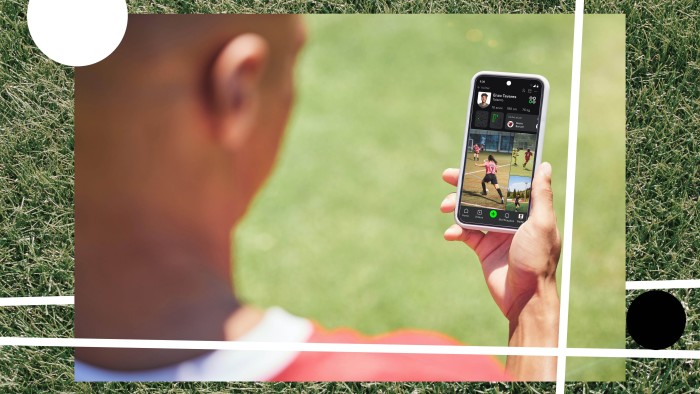As the world’s most famous footballing nation, Brazil has built a deserved reputation as a producer of soccer talent and ranks as the biggest exporter of players globally.
In the search for the next Neymar or Vinicius Junior, sports technology ventures in the biggest country in South America are betting that artificial intelligence will have a key role to play.
If the ability to easily record and upload videos to the internet has already reduced the need for scouts to attend games or training sessions in person, the idea is that AI will take the discovery of promising youngsters to the next level through machine-based analysis of data derived from smartphone clips.
Given Brazil’s huge size and stark inequalities, enthusiasts also believe tech innovations can further break down barriers imposed by distance and poverty on those hoping to attract the attention of talent spotters.
More on The Business of Football
Footbao, which chose the country as its testing ground in 2023, is a kind of TikTok where young hopefuls create an online portfolio of videos showcasing their skills and characteristics. The start-up says more than 100,000 players globally have registered for its mobile app, most of them in Brazil.
Its AI works as an initial filter for its analysts, who identify profiles to meet the specific demands of partner teams. “This helps clubs find players who match their needs more accurately — all at a national scale and with much greater precision,” says Nick Rappolt, Footbao’s chief executive.
Brazil’s passion for the sport, expansive geography and large population of more than 200mn makes it the “perfect launch pad”, he adds. “We believe talent is universal, but opportunity is not, and that’s what we want to change. Our goal is to help young athletes fulfil their dreams of becoming professional players.”
Already on the books of São Paulo outfit Corinthians when she started using Footbao, 16 year-old Glória Gasparini was this year called up to the national side for the South American under-17s championship.
“The app has brought me a greater number of followers on my social networks, and this is essential to encourage other girls who have the same dream as me,” she says.
Footbao says it recently sent five Brazilian teenagers to spend a fortnight training with Italian top-flight side Lecce. They were selected from a shortlist of 20, narrowed down from a pool of 2,000 applicants.
The Apulian club’s CEO, Sandro Mencucci, says established scouting platforms tend to focus on current professionals rather than players “on the street”, adding: “Footbao is different in strategy . . . It could be very helpful”.
The fledgling company says it has raised €5.8mn in funding, comprising a seed investment followed by €5mn this year. Founded by Italian-Swiss entrepreneur Francesco Ciringione and Boris Collardi, the former CEO of Swiss private bank Julius Baer, Footbao says it is already generating income from premium services.
“We are ramping up further revenue streams such as talent management, access to data and predictive analytics for clubs as well as sponsorship and advertising through our application and tournaments”, adds Rappolt.
Brazil is also a focus for Cuju, an app developed and financially backed by the tech arm of Rogon, a German sports player agency. An early version without AI was piloted in Africa nearly a decade ago, Cuju says, before the current format went live in Brazil last year with a mission to “democratise” inclusion in football.
Users perform a series of exercises to display skills, such as dribbling or shooting, and obtain a score. The videos are uploaded to a database where AI compares players from around the world and offers insights for improvements.
“You can compare the exact same skills or exercises from a kid in Brazil with a kid in Malaysia or United States with Africa, so this is pure standardisation and will help make the life of clubs and scouts easier in their search for the next talent,” says Sven Muller, Rogon Technologies’ chief marketing officer.
Cuju did not disclose financial information, but a person close to the company said it had received an initial €5mn investment.
Both apps also hold competitions in Brazil, allowing the highest-ranked players to show off their skills in front of scouts. Cuju says it has 50,000 users in the country, with the majority in Santa Catarina state where it organises a tournament.
Another aim of the initiatives is to boost the development of female professionals, who tend to have fewer opportunities than male counterparts.
“There is a lack of clubs who offer girls training and women’s teams. We found out that Cuju can help them improve their skills because simply we give them access [to training],” adds Muller.
Footbao meanwhile wants to increase the proportion of girls on its platform from one-fifth today to half by 2027, when the Women’s World Cup will be hosted by Brazil.
Despite the hype around how AI could transform swaths of the economy, experts point to the technology’s current limitations for soccer scouting.
Russell Gurr at International Football Consultancy, a Scotland-based international scouting specialist, says an advantage is giving youth players greater exposure.
“Right now AI’s really good as a first level filter of whittling down,” he adds. “After that, at the next level you need human intervention.”
Lecce boss Mencucci says while AI has potential in scouting, for now at least there are factors it cannot account for, such as in the case of foreign signings. “When you choose a player, you need to understand if he can adapt to Italy. That’s important, and unpredictable”.
The technologies may also exacerbate concerns in Brazil about the premature exodus of starlets to richer countries, to the detriment of the domestic game.
The commercial test for the apps will be whether they can become part of the standard scouting toolkit of major league clubs in the years to come.
